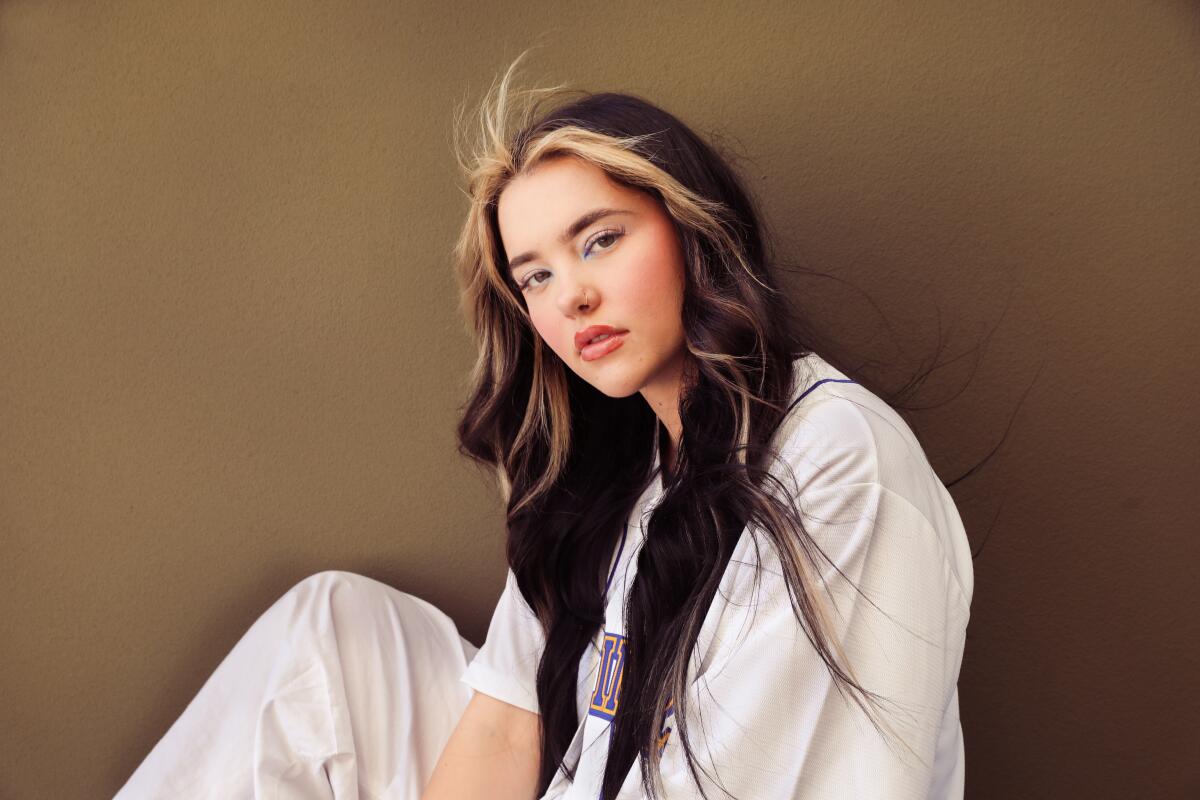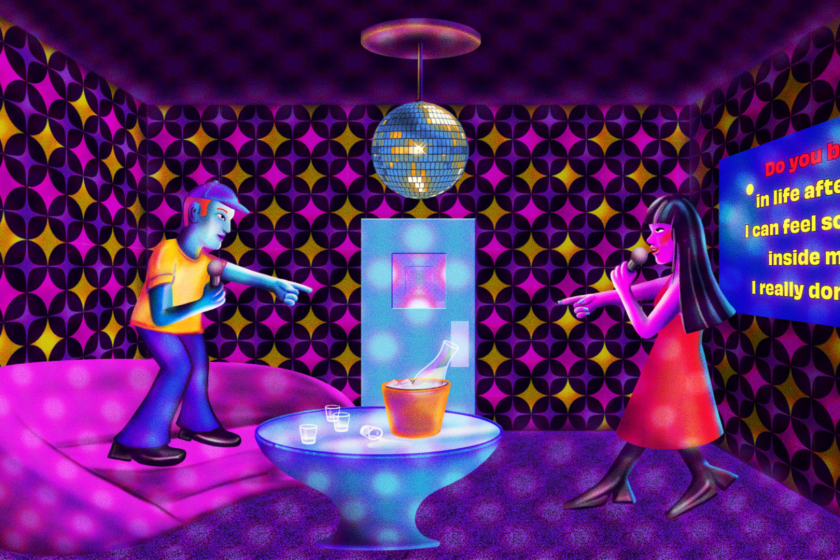From TikTok to the Grammys? Vocal powerhouse Lauren Spencer Smith connects with Gen Z

Think of Lauren Spencer Smith as a one-stop shop for Gen Z’s most pressing emotional needs.
“Whatever you’re crying over, I’ll validate it,” the 19-year-old Canadian pop singer told her young, mostly female audience during a recent sold-out concert — her first-ever headlining gig — at the Troubadour in West Hollywood. “Because I cry over everything.”
Dressed in high-waisted jeans and an oversized denim shirt, Smith was introducing “Flowers,” one of several garment-rending ballads she’s released this year with the clear goal of getting roomfuls of people to howl along with her word for anguished word. That’s certainly what happened at the Troubadour during “Flowers,” in which the singer looks back at a failed relationship with the brutal clarity of hindsight; it happened even more strikingly during Smith’s closer, “Fingers Crossed,” which she called “the song that changed my life.”
Similar to “Flowers” in its stately melody, its sparse arrangement and its theme of romantic betrayal — in this one she concludes that her ex wasn’t just a jerk but a liar too — “Fingers Crossed” became a kind of mass sob-a-thon as Smith’s fans lifted their voices to turn private pain into public catharsis.
“Now I don’t even miss you anymore / I want all the tears back that I cried,” they sang together — a clever way to frame a familiar tale of heartbreak.
Indeed, “Fingers Crossed,” which has been streamed more than 260 million times on Spotify, channels an eternal teenage ache that runs through Taylor Swift and Debbie Gibson all the way back to the lovesick girl groups of the early 1960s. Yet Smith is deploying that old-fashioned sentiment via newfangled means: “Fingers Crossed” first connected with listeners last November when Smith — a big-voiced “American Idol” alum who’d flamed out on the competition series in 2020 — posted a less-than-a-minute-long excerpt on TikTok that quickly went viral; within months, she’d signed a joint record deal with two major labels, Island and Republic, for which she’s working on a debut studio album tentatively set to come out in the spring.

Smith, who’s continued to serve up regular TikToks to her nearly 4 million followers — including one last week showing the crowd at a London club threatening to drown out the singer in “Flowers” — is hardly the only fresh-faced female singer-songwriter to gain traction on the short-form video platform. In August, 21-year-old Katie Gregson-MacLeod broke out after she posted a portion of her song “Complex,” a stark piano ballad about the razor-thin edge “between being numb and feeling everything”; before Gregson-MacLeod, TikTok played a crucial role in the quick ascent of sad-girl stars such as Gracie Abrams, Gayle and Sadie Jean, not to mention Olivia Rodrigo, whose Hot 100-topping “Drivers License” originally took off as a bare-bones acoustic snippet.
“I love that people on TikTok feel so comfortable sharing their feelings, even if it makes some older people go, ‘Why are these kids being so overdramatic?’” Smith says. “When I see someone else crying online, I feel better about telling someone that I cried today.”
Taylor Swift has added 17 more shows to her already expanded Eras tour, including two more gigs in Los Angeles, ‘due to unprecedented demand for tickets.’
Still, few of her peers on the app have found the kind of traditional record-industry success that Smith has with “Fingers Crossed,” which made it to No. 10 on Billboard’s Pop Airplay chart and led to representation with her manager, Andrew Gertler, whose other clients include Shawn Mendes. Now she’s widely thought to be in the running for the coveted best new artist prize at the 65th Grammy Awards, nominations for which will be announced Tuesday.
The Recording Academy has long been drawn to grandly emotional ballads like Smith’s, often when they come from young British singers with show-stopping voices à la Adele, Sam Smith and Lewis Capaldi, all of whose songs she’s covered faithfully in DIY social-media videos. (As it happens, Smith was born in England before her parents moved her and her brother to British Columbia’s Vancouver Island when she was 3.) She’s well aware of the lineage, even though she consumed the Grammys piecemeal while growing up: “We couldn’t afford TV, so I’d look up every speech and every performance on YouTube,” she says over coffee at a sleek hotel on Sunset Boulevard a few weeks after the Troubadour gig. “I was obsessed with knowing who won and why.”
Smith knew she wanted to be a singer — a famous one — from as early as she can recall. When she was 15, a video of her performing Lady Gaga’s “Always Remember Us This Way” exploded on Facebook after her dad posted it; Steve Harvey saw the clip and put Smith on his talk show, where he assured his viewers that she “really can blow.” By the time she made it to “Idol,” she was already thinking in terms of a career: “I honestly wasn’t that sad when I got cut,” she says, “because I knew that when you win a show like that, the contract you end up having to sign always sucks.” She laughs. “I’ve always been very business-minded.”
The singer, who calls herself “an oversharer to the max,” credits that savvy with the fact that she got her first job at age 12 as a host in a restaurant. Was that legal in Canada? “It was not,” she says, which didn’t prevent her from being quickly promoted to a server role; she’d save her earnings to buy the Lululemon leggings her mom couldn’t buy her after a divorce from her dad left the family struggling to pay bills.
Yet her early showbiz experience also taught Smith to value her talent. “The amount of artists that can’t sing these days — you hear them live and it’s terrible — is insane,” she says, whereas Smith’s soulful, slightly serrated voice is of the sing-the-phone-book variety: one of those natural wonders that can move listeners no matter what’s going on around it. When the snippet of “Fingers Crossed” went viral, “labels wanted to sign me right away,” she says, “and I was like, ‘Absolutely not, because the full song is gonna blow up and you’re gonna give me more money.’”
Imran Majid, Island Records’ co-CEO, confirms her account of a label frenzy: “Oh, it was a classic music-industry derby,” he says. But as Smith played him material she was working on, Majid was as impressed by her songwriting as by her singing. “The concepts, the emotion, the little cliffhangers at the end of her songs — it wasn’t formulaic,” he says. Her ambition grabbed him too. “She’s a killer. In a way it’s kind of like a hip-hop story more than a pop story: ‘I come from nothing, I’ve been working my ass off, and whoever I hand this to better not f— it up.’”
Dive bars, live bands, noraebangs, ’80s nights or Hello Kitty decor — there’s a karaoke bar or private room in Los Angeles for everyone.
Smith says her album will tell the story of breaking up with the “Fingers Crossed” guy — a fellow songwriter she declines to name — before falling in love with her current boyfriend, who made her realize how poorly she’d been treated before. Has she spoken to Mr. “Fingers Crossed” since the song became a hit? “No,” she says, “although he’s tried to drunk-call me on many occasions.” She says that when the song came out, she intended to lie if someone on the internet figured out whom it was about.
“Joshua Bassett getting ruined by the Olivia stuff — that was my worst nightmare,” she says, referring to the Disney Channel star assumed to be the real-life inspiration for Rodrigo’s “Drivers License.” “I wouldn’t wish anything negative on anyone no matter what they did to me.”
She’s also taking cues in her music from TikTok. “If you want songs to blow up, they have to include things that people are gonna relate to,” says Smith, who estimates she spends at least an hour on the app every day to get a sense of what’s trending. “For example, right now everyone loves to talk about a red flag — like, ‘I should’ve known when he did this it was a red flag.’ That’s in people’s brains, so let’s include that in a line.”
Asked whether the flipside of that extremely online mentality is that she worries about some morally questionable video surfacing from her past, she laughs. “I’m terrified every day that someone from high school is gonna post some shady s— I said about a girl when I was 14 and insecure,” she says. “But I tell everyone in my life, ‘Look, I was an a—hole until I was 16, because my parents got divorced when I was 9 and one of my best friends died when I was 15.’ I was that kid that felt like the world was against me.”
In fact, she’s still pulling from that deep well of teen angst: In September, Smith posted a moving TikTok in which she previews a new song called “28” — the age of the woman her father evidently took up with recently. “When you first told me about her, you said she was 30 / And I just can’t help but think you knew it was dirty,” Smith sings over a mournful, slow-moving chord progression, “She probably just had her first high-school reunion / You’re probably the first one she’s ever moved in with.” Even as a 60-second excerpt, the song cuts deep.
She admits too that part of what motivates her now is the prospect of told-you-so-ing some of the folks from her small-town high school who’d scoff when she’d talk about her plans to become a big pop star. Scoring that Grammy nomination for best new artist would undoubtedly provide a career boost for Smith, according to Lenny Beer, editor in chief of the industry trade journal Hits. “It increases her credibility, and if she gets a performance on the show, it exposes her to a more adult audience,” Beer says. A nod would also “reconfirm the labels’ belief in her,” Beer adds, at a moment when streaming has accelerated the life cycle of a hit.
More important for Smith, it would mean this: “I literally had a teacher who wrote on the board that I was going nowhere,” she says. “And while she did it I’d be thinking about my Grammy speech — like, ‘Miss Campbell, this is for you.’”
More to Read
The biggest entertainment stories
Get our big stories about Hollywood, film, television, music, arts, culture and more right in your inbox as soon as they publish.
You may occasionally receive promotional content from the Los Angeles Times.












